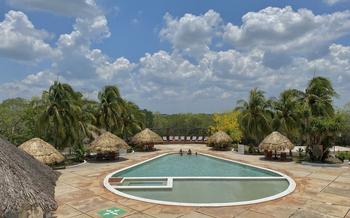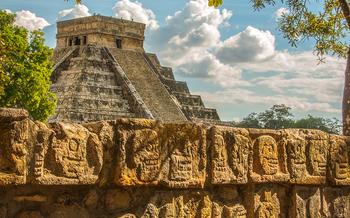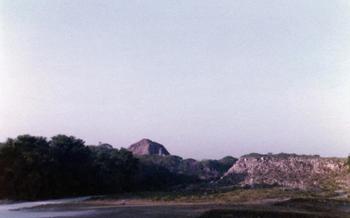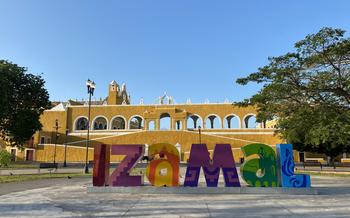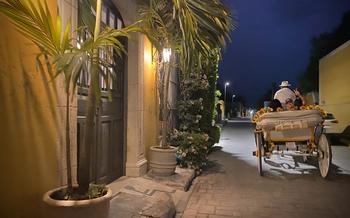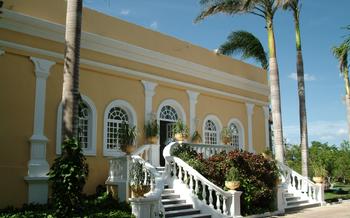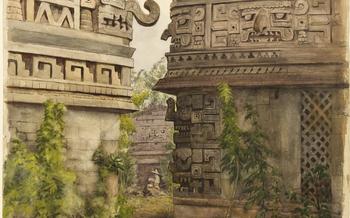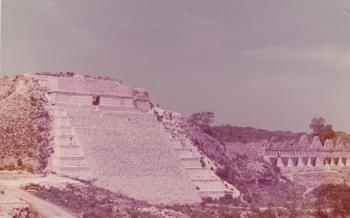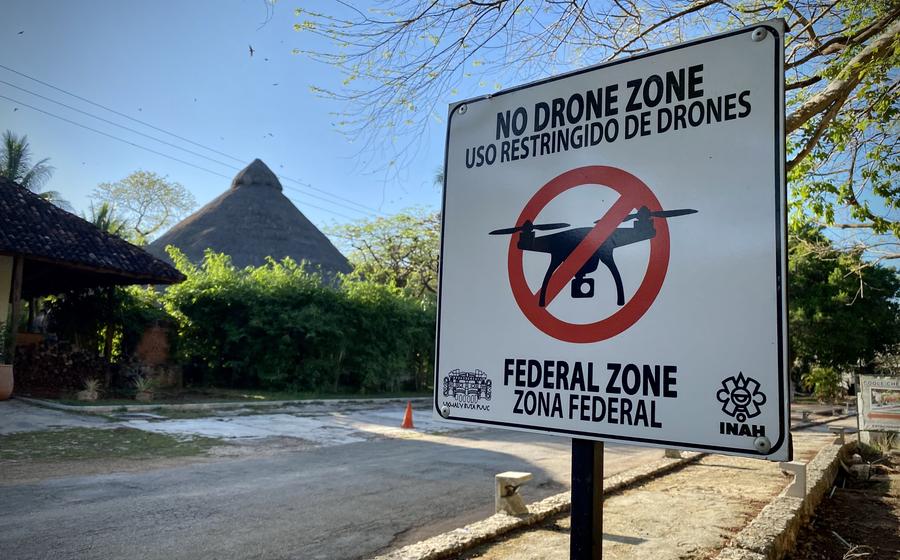
Grutas de Tzabnah
- Historical significance
- Exploring the Grutas de Tzabnah
- The Cenote Xkekén
- The Templo del Jaguar
- The Grutas de Tzabnah Museum
- Tips for Visiting the Grutas de Tzabnah
- Nearby Attractions
- Accommodation Options
- Transportation Options
- Shopping Opportunities
- Nightlife and Entertainment
- Insider Tip: Hidden Gems and Local Secrets
Historical significance
Geological formations have amazed and intrigued people for centuries, and the Grutas de Tzabnah are no exception. These caves were formed millions of years ago when the Yucatan Peninsula was covered by a shallow sea. As the sea level rose and fell over time, water seeped into the porous limestone bedrock, creating a vast network of underground tunnels, chambers, and cenotes.
The Grutas de Tzabnah were first discovered by the ancient Maya, who used the caves for religious ceremonies and rituals. Evidence of their presence can still be found in the form of pottery shards, stone tools, and even human remains. In the 19th century, the caves were rediscovered by European explorers, who were amazed by their beauty and size. Today, the Grutas de Tzabnah are a popular tourist destination, offering visitors a chance to explore the hidden wonders of the Yucatan Peninsula.
Exploring the Grutas de Tzabnah
To delve into the enigmatic depths of the Grutas de Tzabnah, guided tours are a must. Knowledgeable guides, fluent in the cave's history and geology, lead visitors on an awe-inspiring journey through the subterranean chambers. These tours typically last for an hour or two, ensuring ample time to marvel at the cave's stunning formations and learn about its fascinating past.
As you traverse the cave system, be prepared to be mesmerized by a kaleidoscope of stalactites and stalagmites, each one a testament to the patient artistry of nature. The walls themselves are adorned with intricate patterns and textures, the result of millennia of water erosion. Keep your eyes peeled for hidden chambers and secret passageways that reveal even more wonders.
The Grutas de Tzabnah are also a treasure trove for photography enthusiasts. The unique lighting conditions within the cave create a magical ambiance, perfect for capturing stunning shots of the stalactites, stalagmites, and otherworldly rock formations. Don't miss the opportunity to immortalize your spelunking adventure with some truly captivating photographs.
The Cenote Xkekén
Within the depths of the Grutas de Tzabnah lies a hidden gem of natural beauty: the Cenote Xkekén (pronounced “sh-keken”). This subterranean cenote, or sinkhole, is a breathtaking sight to behold, with its crystal-clear waters reflecting the vibrant colors of the surrounding rock formations. A dip into its refreshing waters offers a unique and exhilarating experience, making it a must-visit for adventure seekers and nature enthusiasts alike.
The Cenote Xkekén is easily accessible during a guided tour of the Grutas de Tzabnah. Visitors can marvel at the intricate stalactites and stalagmites that adorn the cave ceiling, while admiring the shimmering reflections on the water's surface. The cenote's tranquil atmosphere invites visitors to take a refreshing swim or snorkel in its pristine waters, surrounded by the awe-inspiring beauty of the cave system.
Beyond its natural allure, the Cenote Xkekén holds cultural significance for the ancient Mayans. It is believed that the cenote was a sacred site used for religious ceremonies and rituals. Its proximity to the Templo del Jaguar, a Mayan temple located within the Grutas de Tzabnah, suggests that the cenote played a vital role in Mayan spiritual practices.
The Templo del Jaguar
Within the Grutas de Tzabnah lies the ancient Maya. This remarkable temple was constructed within a natural cave, utilizing the existing rock formations to create a unique and awe-inspiring setting.
The Templo del Jaguar served as a place of worship and spiritual connection for the Maya, who revered the jaguar as a powerful and revered deity. The temple's interior features intricate carvings and bas-reliefs depicting jaguars and other sacred symbols, offering a glimpse into the Maya's rich mythology and religious practices.
The Maya held ceremonies and rituals within the Templo del Jaguar, seeking guidance, protection, and blessings from the jaguar deity. The temple's secluded location within the cave provided a sacred and serene environment for these spiritual observances.
Preservation efforts have been undertaken to safeguard the Templo del Jaguar, ensuring that this ancient site remains intact for future generations to appreciate and learn from. Visitors to the Grutas de Tzabnah can marvel at the temple's architectural prowess and immerse themselves in the spiritual significance it held for the ancient Maya.
The Grutas de Tzabnah Museum
Within the Grutas de Tzabnah complex, visitors can delve deeper into the rich history and culture of the Maya civilization at the Grutas de Tzabnah Museum. This on-site museum houses a collection of artifacts and interactive displays that provide insights into the ancient Maya's way of life.
The museum showcases a diverse range of exhibits, including pottery, sculptures, and tools that shed light on the Maya's artistic and technological prowess. Visitors can learn about the Maya's intricate belief systems, their advanced mathematical and astronomical knowledge, and their daily lives.
Interactive displays engage visitors of all ages, making learning about Maya culture a fun and immersive experience. Touchscreens, multimedia presentations, and hands-on activities bring the past to life, allowing visitors to feel a deeper connection to this ancient civilization.
The Grutas de Tzabnah Museum serves as an educational resource for both locals and tourists, promoting a greater understanding and appreciation of the Maya's enduring legacy. It's a must-visit for anyone interested in exploring the depths of Maya history and culture beyond the stunning cave formations that make the Grutas de Tzabnah so famous.
Tips for Visiting the Grutas de Tzabnah
To make the most of your visit to the Grutas de Tzabnah, it's essential to plan and prepare accordingly. Here are a few tips to ensure a safe and enjoyable experience:
-
Best Time to Visit: Aim to visit during the dry season (November to April) to avoid heavy rainfall that can affect the cave's accessibility.
-
Dress Code: Wear comfortable clothing and sturdy shoes, as the caves can be slippery and uneven.
-
Accessibility: The caves are generally accessible to visitors of all ages and abilities. However, some areas may require climbing or crawling, so be prepared for a bit of adventure.
-
Safety Precautions: Follow the instructions of your guide and stay within designated paths to avoid getting lost or injured. Be cautious of slippery surfaces and low-hanging stalactites.
Nearby Attractions
In addition to the Grutas de Tzabnah, there are several other attractions worth exploring in the vicinity. The Uxmal archaeological site, located just a few kilometers away, is a must-see for any visitor to the region. This ancient Maya city boasts some of the best-preserved ruins in the Yucatán Peninsula, including the iconic Pyramid of the Magician.
Nature lovers will enjoy visiting the Hacienda Yaxcopoil, a former sisal plantation that has been transformed into a beautiful eco-park. The hacienda offers guided tours of its grounds, which include a cenote, a tropical rainforest, and a variety of exotic animals.
For those seeking a more adventurous experience, the Cenote Dzul-Ha is a popular spot for swimming, snorkeling, and diving. This cenote is located about 20 kilometers from Uxmal and is known for its crystal-clear waters and stunning underwater formations.
Finally, the Loltún Caves are a series of underground caves located about 40 kilometers from Uxmal. These caves are home to a variety of stalactites and stalagmites, as well as a number of Maya artifacts. Guided tours are available, and visitors can explore the caves by foot or by boat.
Accommodation Options
When visiting the Grutas de Loltún, there are several accommodation options to choose from, catering to different budgets and preferences.
-
Hotels in Uxmal: The nearby town of Uxmal offers a range of hotels and guesthouses, providing comfortable accommodations and easy access to the caves.
-
Cabins and Bungalows: For a more immersive experience, opt for a stay in a charming cabin or bungalow nestled within the lush surroundings of the region.
-
Camping Facilities: For those seeking an adventurous stay, camping facilities are available near the caves, offering a unique opportunity to connect with nature.
Tips for finding the best deals:
-
Peak Season: To secure the best deals, avoid visiting during peak tourist season (November-April) when prices tend to be higher.
-
Online Bookings: Take advantage of online booking platforms to compare prices, read reviews, and secure the best rates for your preferred accommodation.
-
Local Recommendations: Ask locals or fellow travelers for recommendations on budget-friendly accommodation options that may not be widely advertised.
-
Negotiation: Don't hesitate to negotiate prices, especially if you plan to stay for multiple nights or during the off-season.
Transportation Options
Renting a Car:
Renting a car is the most convenient way to explore the Grutas de Tzabnah and the surrounding areas. This gives you the freedom to set your own itinerary and visit nearby attractions at your own pace. Rental cars are available at the Mérida International Airport and in Uxmal.
Taking a Guided Tour:
Guided tours are a great option for those who prefer a more structured experience. Tours typically include transportation from your hotel in Uxmal, a guided visit to the Grutas de Tzabnah, and visits to other nearby attractions.
Public Transportation:
Public transportation is a budget-friendly option for getting to the Grutas de Tzabnah. Buses run from Mérida to Uxmal several times a day. From Uxmal, you can take a taxi or colectivo (shared van) to the Grutas de Tzabnah.
Ride-Sharing Services:
Ride-sharing services such as Uber and Lyft are also available in Uxmal. This can be a convenient option for getting to and from the Grutas de Tzabnah, especially if you are staying in a remote area.
Shopping Opportunities
Shopping Opportunities
Handicrafts and souvenirs: The Grutas de Tzabnah gift shop offers a variety of souvenirs, including traditional Mayan handicrafts, textiles, pottery, and jewelry. These items are handmade by local artisans and provide a unique way to support the local economy while commemorating your visit.
Local markets: For a more immersive shopping experience, visit the local markets in Uxmal. Here, you'll find a vibrant array of fresh produce, spices, and traditional Mexican dishes. You can also find unique souvenirs, such as handmade hammocks, baskets, and clothing.
Art galleries: Uxmal is home to several art galleries that showcase the work of local and regional artists. These galleries offer a glimpse into the contemporary art scene and provide an opportunity to purchase one-of-a-kind pieces.
Tips for bargaining: When shopping in Mexico, it's customary to bargain for prices. Start by offering a lower price than what is asked and be prepared to negotiate. Be polite and respectful, and don't be afraid to walk away if you're not satisfied with the price.
Nightlife and Entertainment
Uxmal may not be known for its bustling nightlife scene, but it offers a unique and authentic cultural experience. Instead of nightclubs and bars, visitors can immerse themselves in traditional Mayan cultural shows, showcasing vibrant dance performances, music, and storytelling. These shows often take place in local community centers or cultural venues and provide an opportunity to learn about Mayan traditions and heritage.
For those seeking a more lively atmosphere, the nearby town of Mérida offers a vibrant nightlife scene with bars, nightclubs, and live music venues. Mérida's nightlife caters to various tastes, from traditional Yucatecan music to international DJs and bands. Visitors can enjoy a night out dancing, listening to live music, or simply relaxing in a cozy bar.
Remember that Uxmal is a small town primarily focused on cultural and historical tourism. Respect the local customs and traditions, and prioritize safety when exploring the nightlife options.
Insider Tip: Hidden Gems and Local Secrets
Beyond the well-known attractions, Uxmal and its surrounding areas offer a wealth of hidden gems and local secrets waiting to be discovered. Venture off the beaten path to find secluded cenotes tucked away in the lush jungle, where you can swim and snorkel in crystal-clear waters amidst a tranquil setting. Explore lesser-known archaeological sites that provide a glimpse into the region's rich Mayan history, free from the crowds of tourists. Attend local festivals and events to immerse yourself in the vibrant culture and traditions of the Yucatan. Ask locals for recommendations on their favorite spots to eat, shop, and experience authentic Mayan cuisine and hospitality. With a little exploration and curiosity, you'll uncover the hidden treasures that make Uxmal a truly special destination.
